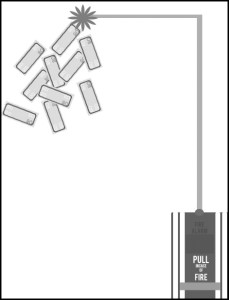KELLY PYZIK, Editor-in-Chief
pyzikkel@grinnell.edu
Students who violate the College’s smoking policy and cause a fire alarm and/or building evacuation will now be subject to a $500 fine, according to new Student Handbook policies instituted at the beginning of this academic year. This is an addition to the $500 fine in place for tampering with smoke detectors in dorm rooms that has been the policy for many years.
This decision was made by the Student Affairs department, in addition to other yearly Student Handbook updates, out of a desire to improve fire safety and reduce the incident rate of fire alarms, which detract from the ability to sleep and study in residence halls, as well as to create more fairness in conduct policies.
“Most policy changes that happen administratively are informed by federal compliance, clerical or clarity edits, etc. But this change was inspired by fairness … we felt it unfair that a person who covered their smoke detector got a fire safety fine but a person who evacuated a building due to their personal smoking setting off a detector was not held accountable,” wrote Associate Vice President of Student Affairs Andrea Conner in an email to The S&B. “In the first, the student put their safety and the safety of their community at risk by disabling the detector. In the second, the student disrupted the experience of their hallmates and desensitized the community to the need to evacuate during a fire.”
There were some rumors at the beginning of the year that fire alarm fines would be charged to an entire residence hall floor, but according to Joseph Rolon, Interim Assistant Dean of Students and Director of Residence Life & Orientation, Campus Safety and Security is able to trace the origin of the alarm to a specific dorm room. Only the residents of that room will be fined and will be split among roommates unless one chooses to take full responsibility. However, if the fire alarm and/or building evacuation is caused by cooking in a common area kitchen or another policy permitted by College policy, no fines will be charged.
Rolon hopes this new conduct fine will motivate a decrease in the number of fire alarms interrupting life in the residence halls.
“My philosophy on Res. Life is that this is your home away from home. You need to be comfortable in your home. … Anything, whether it’s alcohol, drugs, alarms going off, anything that impacts where you live needs to be addressed,” Rolon said.
He also hopes that a decrease in fire alarm frequency will encourage students to evacuate a building every time an alarm is set off.
“We need students to understand … [that] when you hear a fire alarm, you need to evacuate. Many students wouldn’t evacuate and part of this was because there were students either intentionally smoking in their room or doing something that would set off the fire alarm. … We don’t want students desensitized to the alarms,” Rolon said. “When I don’t see students evacuating a building during an alarm … that is distressing.”
Grace Lloyd ’16 said that she has seen many students react to fire alarms with indifference.
“My first two years I was on East campus, fire alarms never went off. But a lot of my friends lived on South, and if I hung out in their dorms, it was a pretty regular thing for a fire alarm to go off or for smoke detectors to be covered,” Lloyd said. “Fire safety wasn’t really cared for. Maybe because I was on East at first, I took it more seriously … it’s not that hard to step outside.”
Incoming students and Student Advisors were notified during the harm reduction session of New Student Orientation and the Student Handbook is available for all students on the College website. The new policy can be found under “Smoking” in the “Campus Life Policies” section.
The Student Affairs department and other involved staff members feel this new policy adds a sense of communal accountability that is very much in line with self-governance.
“The Iowa Clean Air Act of 2007 which forbids smoking in spaces like our residence halls is a social justice-based law — it is meant to remove the burden from those who do not wish to breathe in secondhand smoke of any kind from having to advocate and puts the responsibility on those who choose to smoke to do so in a place that minimizes harm to others in the community,” wrote Wellness Director Jennifer Jacobsen in an email to The S&B. “That makes it a great reflection/enaction of the responsibilities inherent in self-governance.”



















































